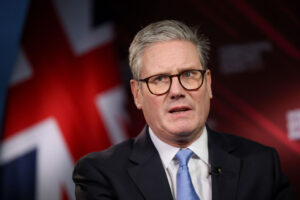There are periods in history when old certainties and settlements suddenly begin to fracture under the weight of their own contradictions. In the Thirties and Seventies the very nature of the system seemed to be collapsing in on itself. Yet our decline then was not, in the end, the result of some decadent failure, but of forces beyond our control: America’s successful coming of age.
Today, it is hard not to be spooked by the sense that once again we are entering one of these eras that will overwhelm our rotting old order. Waves of Chinese industrial might threaten to overwhelm the last of our competitive industry, while the alarming approach of AI and unpredictable rise of Donald Trump risk upending everything else. And as Keir Starmer prepares to set out his long-awaited “Programme for Change” even his close advisors sense the ground shifting beneath their feet. They have the feeling that they are representatives of both the emerging new world as well as place holders in an interregnum before something else entirely.
It is a striking image — of regents rather than monarchs — and surprisingly self-aware from a Government that in many other respects gives every indication of not appearing to understand the scale of the challenge it faces.
A sense of unease has settled over the country, too, barely five months into its new Government. The Prime Minister’s goal is to lift this ennui with the most important speech of his premiership. Yet he will almost certainly fail. Not because what he says will be unreasonable or the targets he sets wrong — they will be neither — but because we are entering one of those periods of change which requires a form of leadership that is beyond him. Perhaps even beyond any of our leading politicians today.
Charles de Gaulle governed France through two great moments of upheaval. Having created the “necessary myth” of a country united in resistance during the war, his second great achievement, according to his biographer Julian Jackson, was to turn France’s defeat in Algeria in 1962 into a sort of victory. He told the French that, “although militarily victorious, [they] had granted Algeria independence in accordance with her historic commitment to human rights”. The story was not true, of course, but after years of turmoil and shame, the French were happy to believe it. De Gaulle later reflected in his War Memoirs that however difficult the reality might have been during his time in power, he had always felt able to master it, “by leading the French there through dreams”.
It is this sort of leadership that is required in moments of great tumult, when a collapsing old order must be refashioned into a moral story of political will. It was, in essence, Margaret Thatcher’s greatest achievement, killing the failing post-war consensus and ushering in something new with a story of industrial revival that did not come to pass, but which nevertheless provided a sense of purpose.
The problem with Starmer’s attempted reset is that he is moving in the opposite direction; lowering the nation’s sights, leading not through dreams but powerpoints. We know that in his speech, Starmer will attach at least one specific target to each of his five “missions”, along with an extra promise to reduce immigration. This is all part of his chief of staff Morgan McSweeney’s belief that this government needs to kill the “fiction” that politicians can fix everything, because this in itself damages public trust. Instead of trying to do too much, McSweeney argues that Labour governments must remain focused on practical policies which improve people’s lives.
For those around Starmer there is no alternative. “Of course delivery is not enough,” one senior figure told me. “But if we don’t get waiting lists down and don’t get immigration down there is no story we can tell.” The purpose of Starmer’s speech today, then, is to make his “missions” more tangible, creating that sense of progress — if not achievement — that is currently so obviously lacking. Targets, not dreams. It is striking that those advising Rishi Sunak had the same idea. Such was the lack of faith among voters at the time, his advisers argued, that only a set of specific and deliverable objectives had any chance of convincing people he was serious. Yet by the end of his time in power Sunak appeared lost, unable to cope with the scale of the challenge, finding solace merely in the performance of power, completing his paperwork to give him a sense of progress and purpose if nobody else.
The Sunak and Starmer approach to government is not without merit, of course. The danger of governing through dreams is that dreams are not real. As Gladwyn Jebb remarked of de Gaulle, his legacy was “to cast his country into a role which was beyond her power”. As a result, de Gaulle’s successors are doomed to live up to an impossible myth — just look at Emmanuel Macron.
So the danger of McSweeney’s approach is that as Britain’s challenges grow, the Government’s ambitions fall and public frustration increases. Because the health service is in such a bad state, for example, the new target is simply to get back to the kind of waiting-times that we once took for granted. And meanwhile people’s everyday experiences of the NHS deteriorate. We can order Christmas presents to our doors at the click of a button, but to attempt to see a doctor is to do battle against an unresponsive, maddening and seemingly unreformable bureaucracy. It is pretty obtuse not to realise that public anger at this basic failure is bound to grow; the decreasing length of the waiting lists for routine operations will only infuriate those who can’t get through a GP’s door.
Politics, as the conservative philosopher Michael Oakeshott observed, is ultimately the navigation of “a boundless and bottomless sea” where there is neither a starting-place or an appointed destination. Yet it is impossible to steer your course without looking up to the horizon.
Those close to Starmer understand the dangers of appearing to fixate on a set of arbitrary targets as the world transforms around them; the boundless and bottomless sea suddenly raging while the captain merely stares at the map. As one senior aide reflected, the ultimate challenge is not just convincing Starmer of the importance of storytelling, but fashioning a specifically Labour story appropriate to the challenges facing the country. Because from immigration to energy transition and shifting social norms, changes are coming which threaten to overwhelm many of Labour’s most sacred shibboleths.
“Something new is happening,” one aide told me, “and so many of the old beliefs are falling away.” This is taking place at such speed, he said, that the party has begun doubting itself. Labour today is no longer defending the benefits of immigration but attacking “the one-nation experiment in open borders” inflicted on Britain by the Conservatives. Facing its first motor plant closure, the business secretary Jonathan Reynolds declared he was not prepared to accept deindustrialisation. What will happen when the flood of cheap Chinese-made electric vehicles sweeps through the country, and further plants begin to close? What then?
In previous eras of momentous change, new parties or ideologies rose in response: the Labour Party in the Twenties and Thirties, and Powellism followed by Thatcherism in the Sixties and Seventies. It has not gone unnoticed that Nigel Farage’s Reform lies in second place in 98 constituencies today — 89 of which are held by Labour, including 60 in the north of England and 13 in Wales. On each of the great challenges now facing Britain — immigration, net-zero, China and Trump — Farage is now well-placed to take advantage. He has his dream. He is also said to be ruthlessly focused on the “Waitrose mums” he needs to make his next great leap in the polls as part of his now public ambition not simply to win more seats, but to “win” the next election outright.
To succeed in government, then, Starmer must do more than deliver on the targets he sets today. He needs to lead the British there through the dreams they already have, not by fiddling with taxes and targets. It is a cliche that political leaders campaign in poetry but govern in prose, but in times of upheaval only those who retain a poetic imagination can write their own reality. Starmer, though, is no bard.
Disclaimer
Some of the posts we share are controversial and we do not necessarily agree with them in the whole extend. Sometimes we agree with the content or part of it but we do not agree with the narration or language. Nevertheless we find them somehow interesting, valuable and/or informative or we share them, because we strongly believe in freedom of speech, free press and journalism. We strongly encourage you to have a critical approach to all the content, do your own research and analysis to build your own opinion.
We would be glad to have your feedback.
Source: UnHerd Read the original article here: https://unherd.com/



